
Why Clothing Brands Fail
Top Different Types of Shirts for Women and Men Top Different Types of Shirts for
Discover the Types of Buttons That Transform Style and Functionality
The most widely used buttons are made of plastic, which is inexpensive and lightweight. They are perfect for casual and children’s wear because they are available in a variety of colors and shapes.
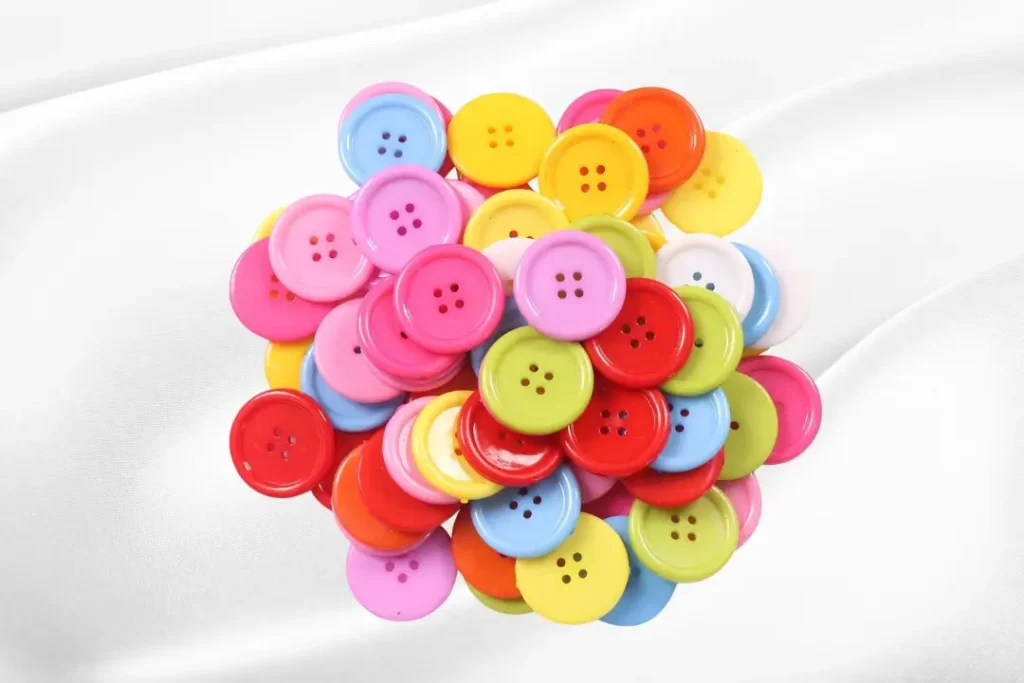
Metal buttons are frequently used on uniforms, jackets, and trousers because of their reputation for toughness. They last longer than most alternatives and give off a striking, industrial vibe.
These organic buttons give clothing a rustic, earthy feel while also being environmentally beneficial. Typical of organic or handcrafted clothing brands.
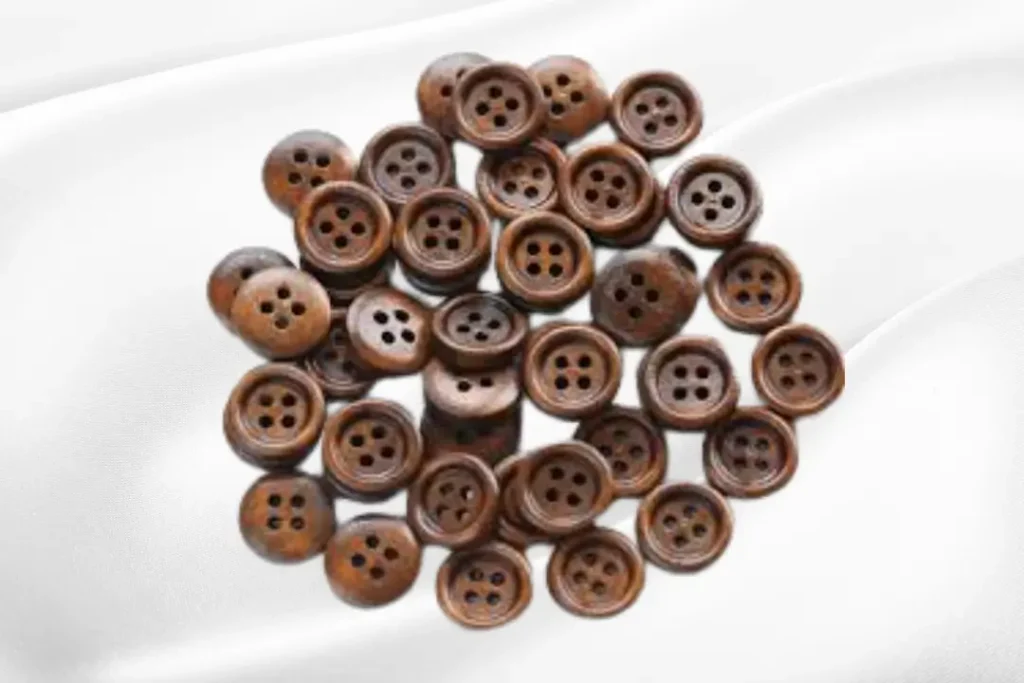
Elegant and slightly iridescent, these buttons are made from actual seashells, usually mother-of-pearl. Ideal for high-end dresses and shirts.
These are ornamental and uncommon glass buttons. They are perfect for a special occasion dress or collectors’ clothing because of their translucent appearance and vintage appeal.
These buttons, which are made from synthetic materials or animal horn, have an upscale appearance. Frequently found in expensive jackets or coats.
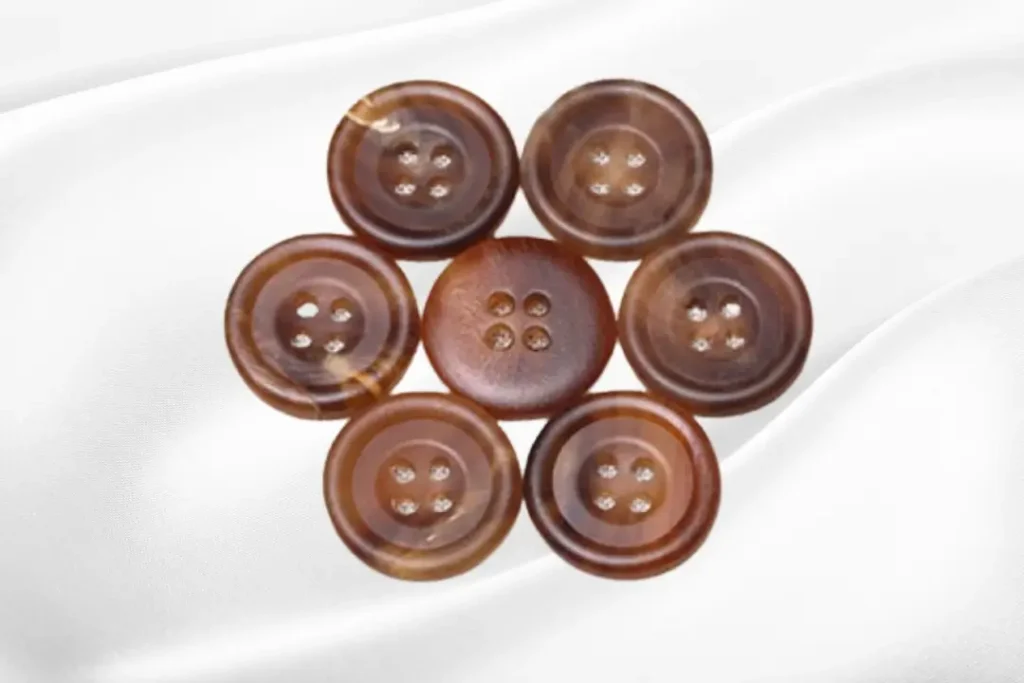
Buttons made of molded or covered leather are both fashionable and long-lasting. They go nicely with outerwear materials like suede and tweed as well as wool.
These are sewn straight onto clothing and have obvious holes in them. They are useful and simple to swap out and can be found in lightweight coats, shirts, and blouses.
Shank buttons are devoid of holes and include an integrated loop at the rear. They elevate coats and formal attire by sitting just above the fabric.
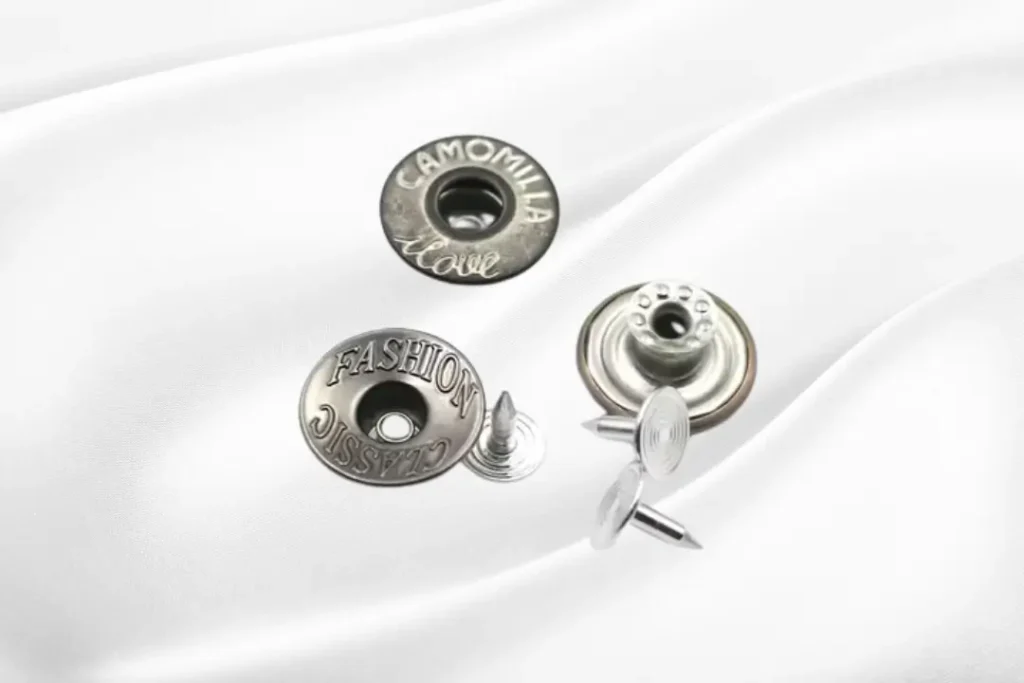
Snap buttons, which are used in athletic and children’s clothing, click into position without threading. They are perfect for clothing that is worn frequently and is fastened quickly.
Often seen in duffle coats, these cylindrical buttons are connected by loops. They have a distinctive, tough appearance and a safe closure.
Magnetic buttons are used in adapted apparel to provide convenience and functionality for those with dexterity problems or disabilities.
Stud buttons are made up of two halves that click together and are frequently found on western or denim garments. They provide a sturdy grip and a neat appearance.
Blazer buttons are typically bold and ornamental, made of metal or horn. To add more formality, they are placed on the fronts and sleeves.
Shirt buttons are usually flat and small and are made to be simple and functional. Available in resin, shell, or plastic.
Thick metal buttons with a tack back are used in jeans and are designed to endure wear and strain over time
Coat buttons are large, robust, and designed for colder temperatures and heavier textiles. They frequently have shanks to make using them with gloves easier.
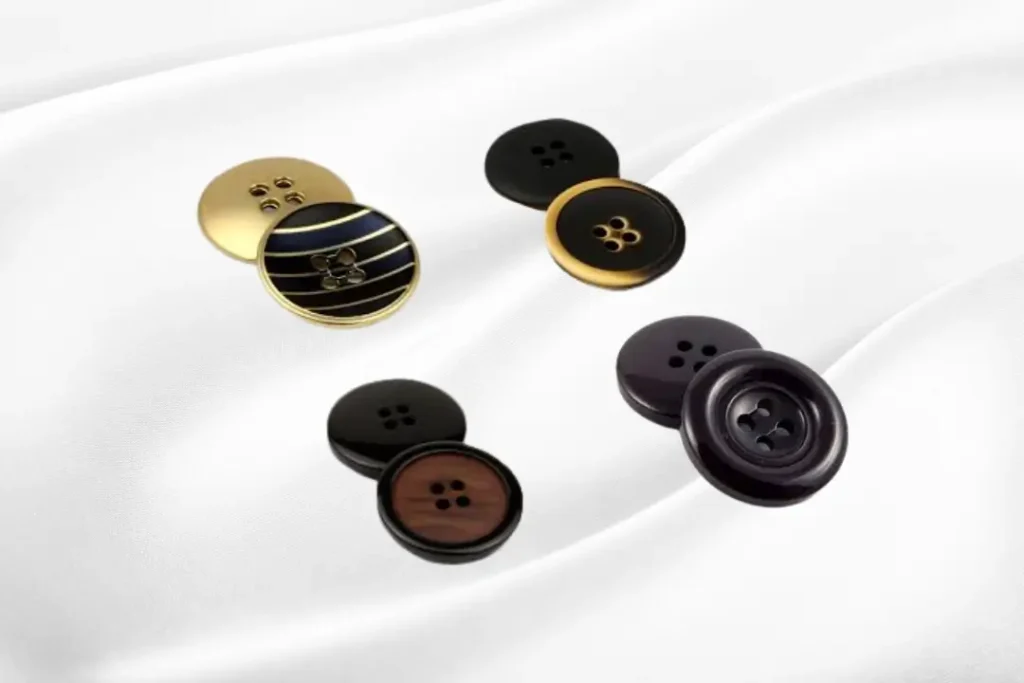
Cuff buttons, which are seen on sleeves, particularly dress shirts, might have hidden snap closures or cufflinks as decorative accents.
Decorative buttons that are only decorative are not necessarily useful. They are frequently employed to improve aesthetics in designer works.
These buttons blend in well because they are made of the same fabric as the garment. For that smooth, silky finish, you frequently see them on formal attire or bridal gowns.
Novelty buttons are entertaining and evocative, and they are shaped like cartoon icons, stars, or animals. They are ideal for bold, imaginative fashion pieces or children’s clothing.
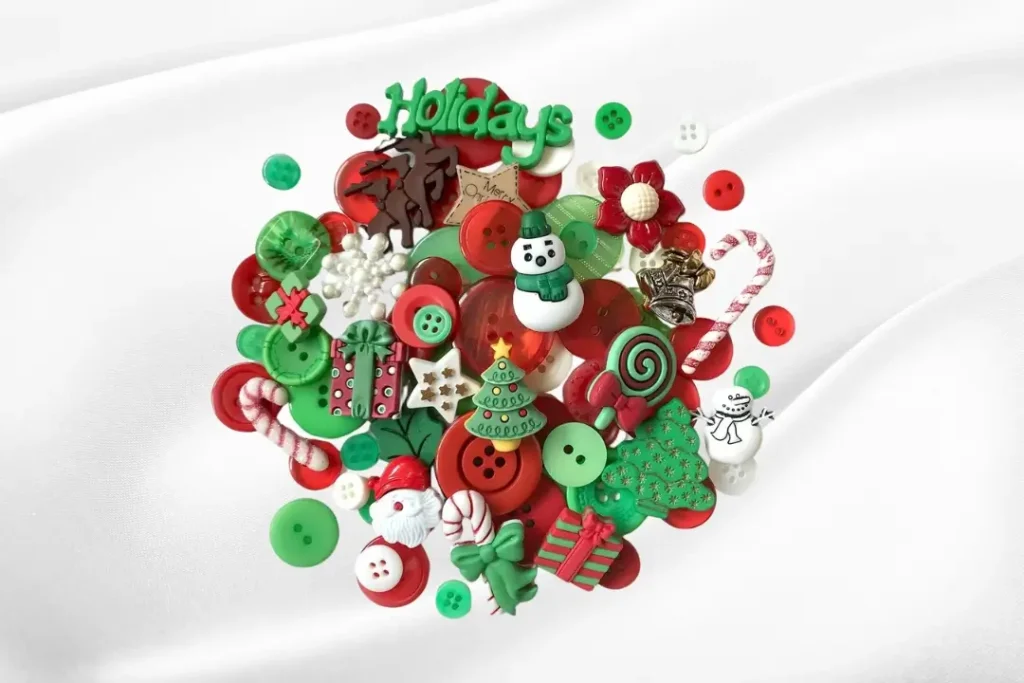
Rhinestone buttons are a great way to add a little shine to any outfit. They create standout pieces out of coats, cardigans, and accessories with their sparkling stones.
These buttons, which typically have crests or insignias, were inspired by army uniforms. They provide coats, jackets, and anything else with a bold, sharp edge structure and attitude.
Pearl buttons are classic yet understated, adding elegance and tenderness. Wedding dresses, elegant blouses, and any item that demands a refined touch will all have them.
These buttons tell a narrative. Particularly on uniforms or designer items, they give branding and texture with raised names, logos, or patterns.
These buttons, which are made from materials like wood, coconut shell, or recycled plastics, promote eco-friendly fashion and reduce their negative effects on the environment.
Buttons made of clear plastic or acrylic blend in with any fabric, so they are good for sheer garments or situations where you do not want others to notice the button.
These buttons are useful for reversible garments, offer a creative design option, and are functional from both sides.
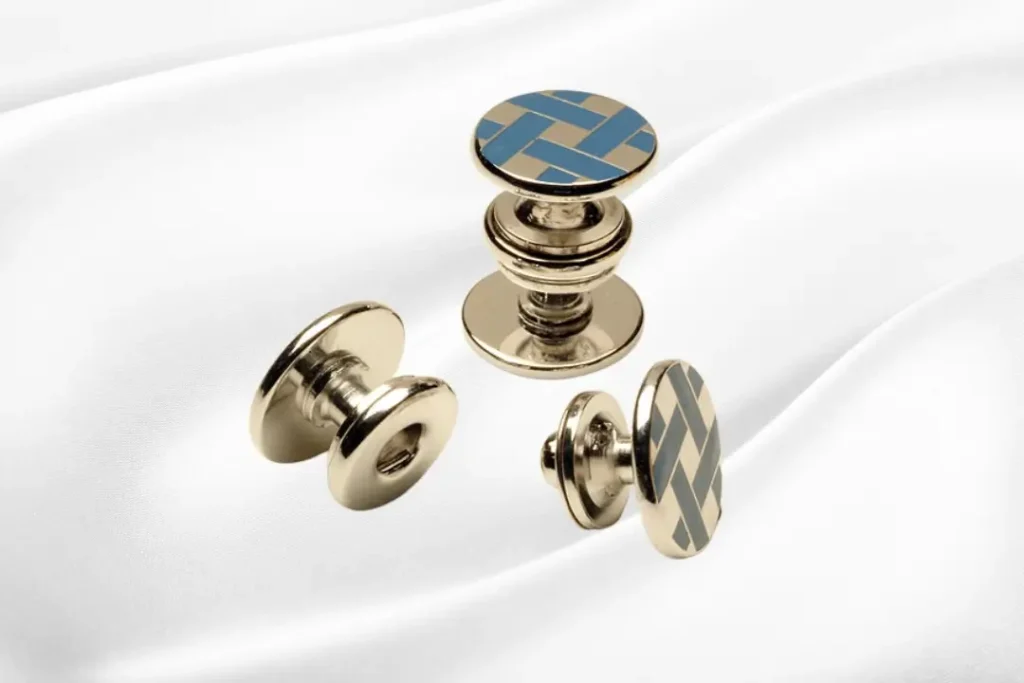
These are ideal for customized or multi-look ensembles because they have a foundation that stays on the garment, and the button face may be changed.
These buttons provide a safety aspect and glow in low light, making them ideal for children’s nightwear or outdoor clothing.
Explore how different types of buttons are used across industries:
High-end fashion refuses to be mediocre. To add even more beauty, designers love to use buttons made of shell, pearl, or elaborate metals. In addition to fastening, these buttons finish the appearance, lend an air of luxury, and frequently capture the distinct character of the brand.
The best option for a well-tailored hospitality uniform or a dapper military jacket is metal and embossed buttons. They are made to last, maintain their polish under duress, and boldly display emblems or insignia that stand for responsibility and expertise.
Denim runs on durability. Jeans buttons, studs, and strong snaps aren’t just part of the look, they’re made to hold up through years of wear. These buttons add character, reinforce the rugged style, and stay put no matter how many times you wear and wash your favorite pair.
Kids’ clothes need buttons that work as hard as they play. Snap buttons, fun shapes, and glow-in-the-dark options turn dressing into a game. They’re safe, simple for little fingers (and tired parents), and bring a smile with every outfit.
Buttons made of wood, coconut shells, and other eco-friendly materials are preferred by sustainable manufacturers. In a world of quick fashion, these natural finishes give clothing a cozy, organic feel that appeals to eco-conscious ideals.
With so many types of buttons available, selecting the right one depends on:
Heavy fabrics need strong buttons like metal or toggles to hold everything in place without popping off. Lighter materials do better with flat, low-weight options like plastic or shell.
Want to keep it clean? Go for minimal buttons. Want to stand out? Add bold or decorative buttons that double as a design feature.
For clothes that get used often, like uniforms or wear, snaps and magnetic buttons make dressing quicker and easier.
Custom or embossed buttons can quietly speak for your brand, giving your pieces a unique, recognizable touch.
Buttons do more than close a garment, they shape how it feels, works, and looks. Whether it’s a snap-on rugged denim or a polished pearl on formalwear, the right button brings everything together.
At Experto, we start with the details because they set the tone for the whole piece. From your fabric to your fasteners, we help you build garments that last, wear well, and look exactly how you imagined.
Expert Custom Clothing Manufcaturer

Top Different Types of Shirts for Women and Men Top Different Types of Shirts for

What You Must Know About Clothing Samples? Before You Produce a Single Garment: What You

How Much Does It Cost To Make a Hoodie A Complete Cost Breakdown for Custom

Discover the Types of Buttons Discover the Types of Buttons That Transform Style and Functionality
Most Recent Posts
Expert Custom Clothing Manufcaturer
Join our Mailing list!
Get all latest news, exclusive deals and updates.